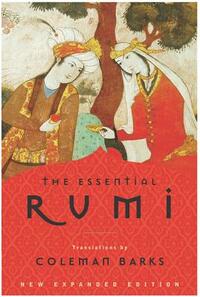Take a photo of a barcode or cover
challenging
emotional
hopeful
informative
inspiring
lighthearted
mysterious
reflective
relaxing
slow-paced
The poems were a bit hit or miss, would recommend as when Rumi is on point you feel very immersed in a peaceful spirituality.
However there is nothing you could say to me to convince me that Rumi isn't as gay as gay can be, his love for Shams was a great motif throughout his work.
Do read, but in small sessions.
However there is nothing you could say to me to convince me that Rumi isn't as gay as gay can be, his love for Shams was a great motif throughout his work.
Do read, but in small sessions.
It was hard for me to relate to all of the god stuff - which being a Sufi mystic was the majority of his work. There were some gems here and there that kept my attention and desire to read on.
“Where did I come from, and what am I supposed to be doing?
I have no idea.
My soul is from elsewhere, I’m sure of that,
And I intend to end up there.”
“Where did I come from, and what am I supposed to be doing?
I have no idea.
My soul is from elsewhere, I’m sure of that,
And I intend to end up there.”
Excellent poems. I can’t weigh in on the translation controversy. Of course these translated poems are by both Rumi and Barks, but purity is a vanishing goal to seek anyway. Why not reimagine Rumi for a modern English speaking audience? The durability of his poems, that they continue to move and touch lives, is their highest achievement.
Some of the passages here are beautiful, but the problem is that they are not Rumi. They are Coleman Barks' interpretation of existing English translations. He does not speak Persian/Farsi himself. In addition, Rumi was a Sufi scholar and Islam is central to his work. Much of that is lost in Barks' version in favor of some sort of New Age type spirituality. The allusions to sex/wine, etc seem almost hedonistic here, and the original symbolism is lost.
Barks does a great job of translating this 13th-century mystic's words into English verse that maintains the magic, delicacy, and simplicity of the original. Rumi's Persian heritage is discussed and explained as well. His poetry is about love, death, pleasure, human weakness, longing; in short, life. Rumi's work is full of passion, joy, and humor. All fans of poetry should not miss this delightful work.
I really struggled with this book, and after looking through the reviews, I think I better understand why. When I was reading this, it didn't really seem like what little Rumi I was aquanited with. And then I realized that's probably because Coleman Barks is interpreting Rumi, rather than really translating his work. Or maybe I'm just a grump.
Nothing short of magnificent. The translations are beautiful and the intros to each chapter are helpful, meaningful, and fascinating. This book will continue to be a great inspiration to my spiritual practice and to others I come into contact with. This is a book I will be reading again and referencing for many years to come.
These are poems for life, life's paths mapped and walked and understood and retold. And they show how so many things have remained the same (comfortingly) for aeons (the poems were written in the 11th century). Of course they're in translation so something must have been lost along the way, but still they convey so much that is essential to us human beings:
from page 106 of my edition:
The minute I heard my first love story
I started looking for you, not knowing
how blind that was.
Lovers don't finally meet somewhere.
They're in each other all along.
from page 106 of my edition:
The minute I heard my first love story
I started looking for you, not knowing
how blind that was.
Lovers don't finally meet somewhere.
They're in each other all along.




